人教版 英语选修7 Unit 3 Under the sea Language-points 课件(共39张)
文档属性
| 名称 | 人教版 英语选修7 Unit 3 Under the sea Language-points 课件(共39张) | 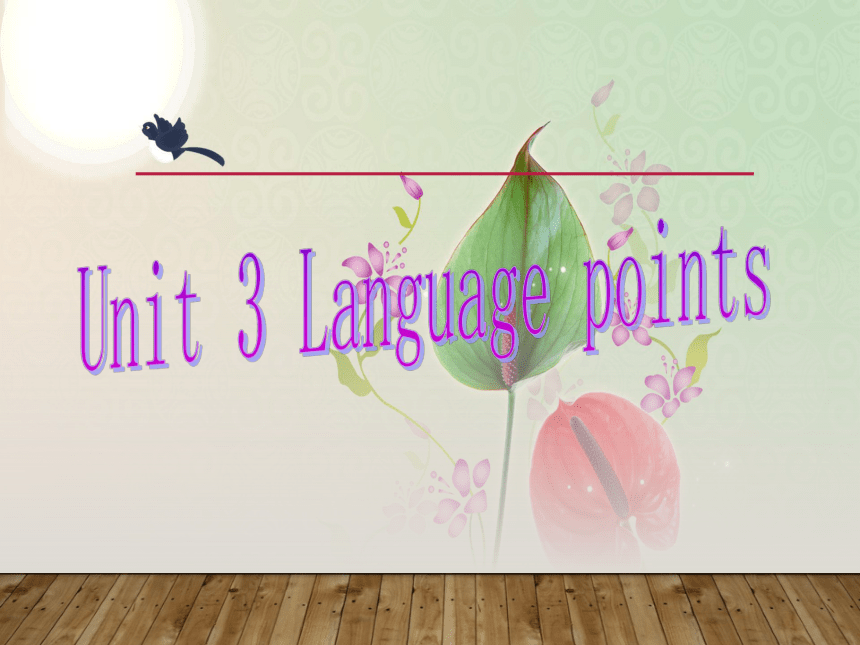 | |
| 格式 | zip | ||
| 文件大小 | 572.8KB | ||
| 资源类型 | 教案 | ||
| 版本资源 | 人教版(新课程标准) | ||
| 科目 | 英语 | ||
| 更新时间 | 2019-05-25 08:23:14 | ||
图片预览

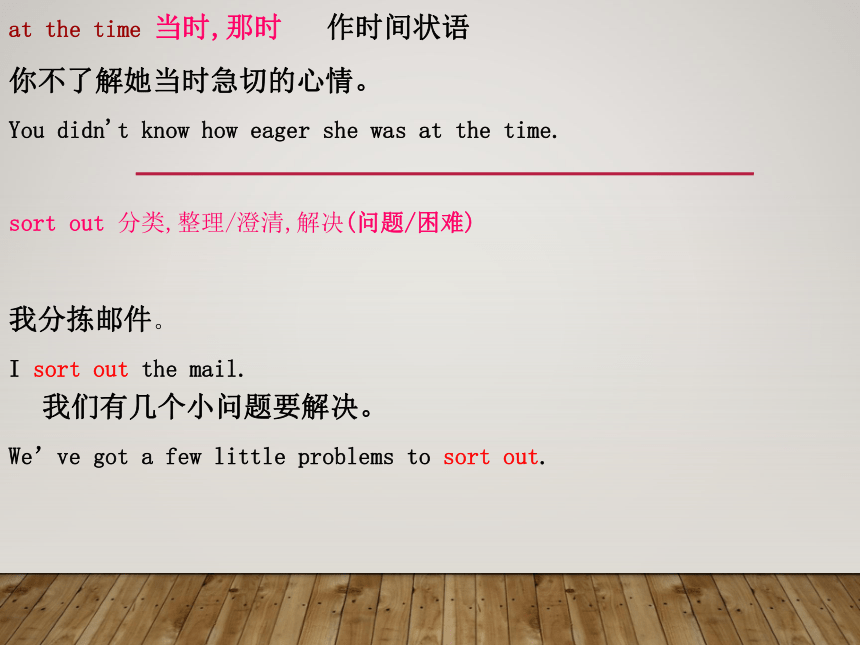
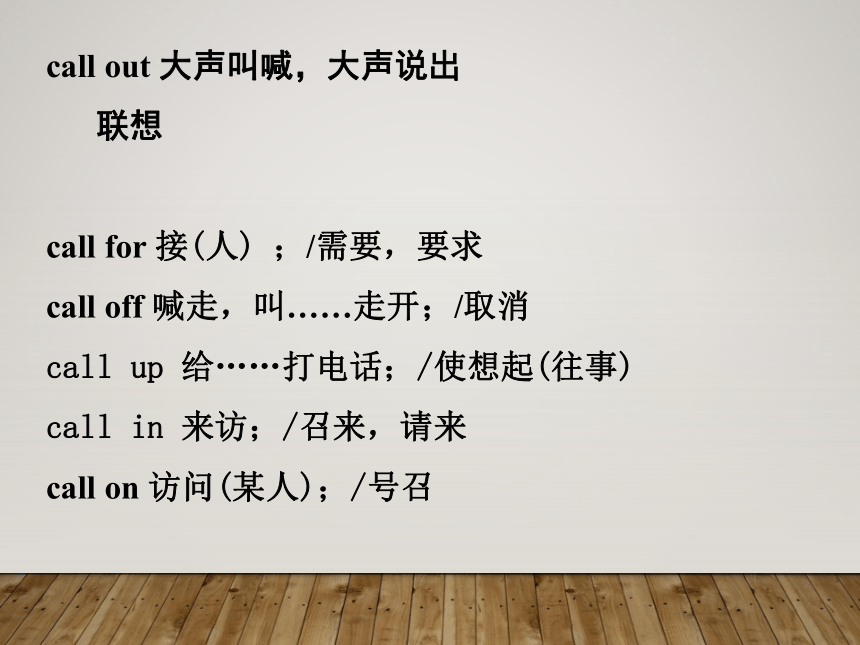
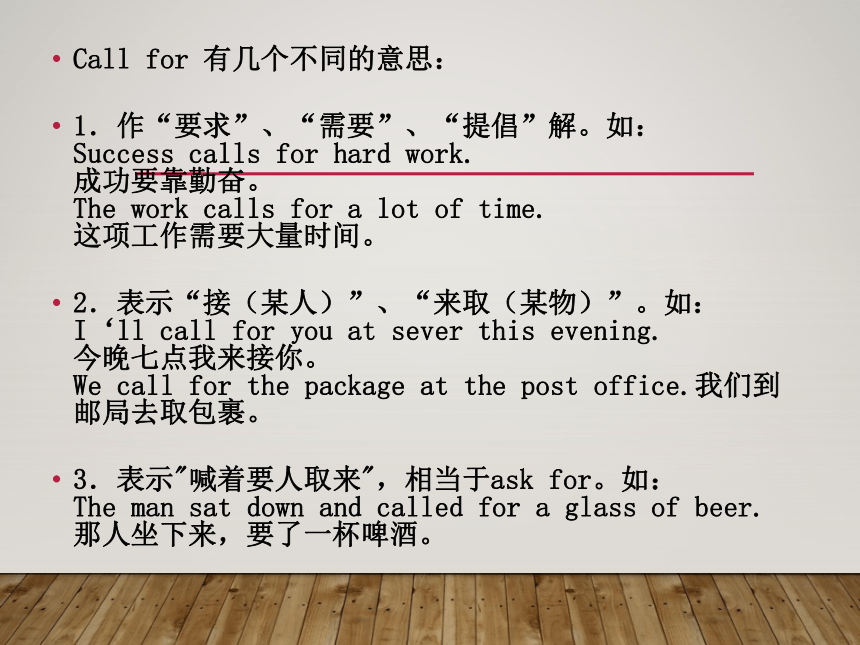
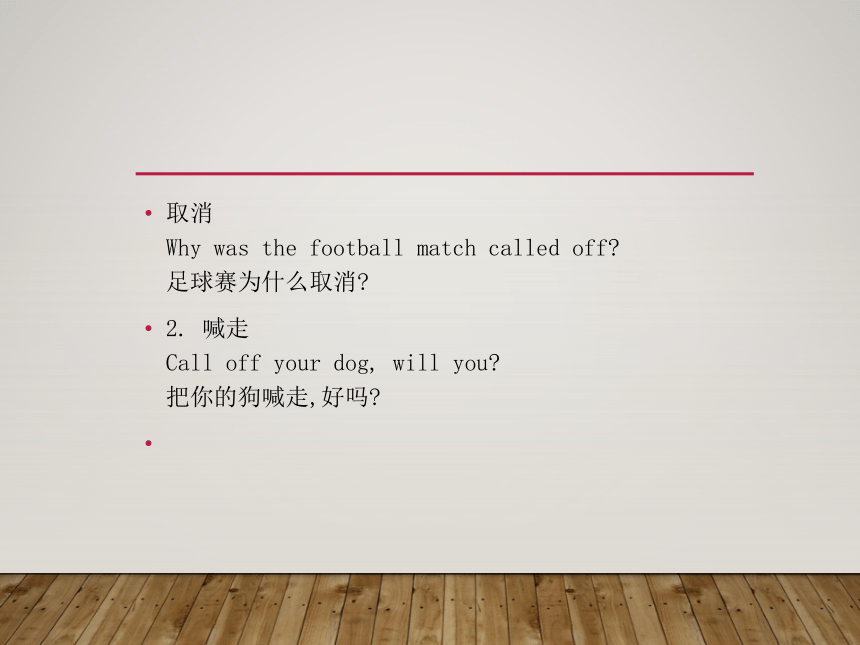
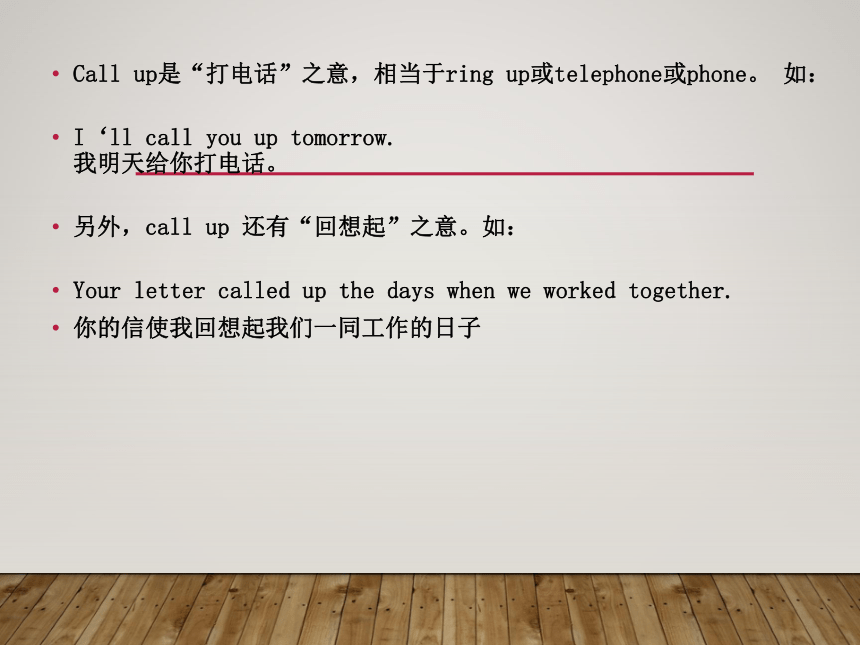
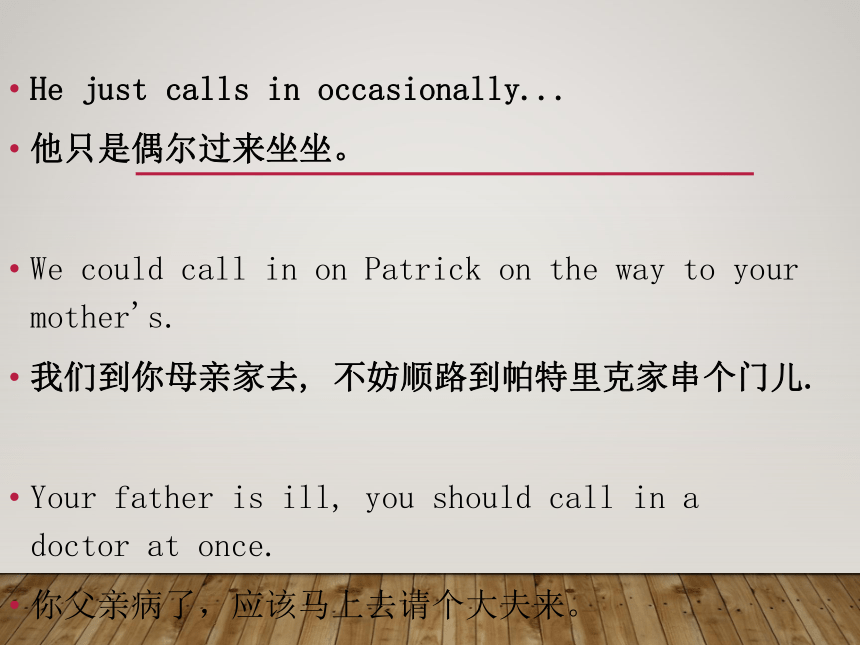
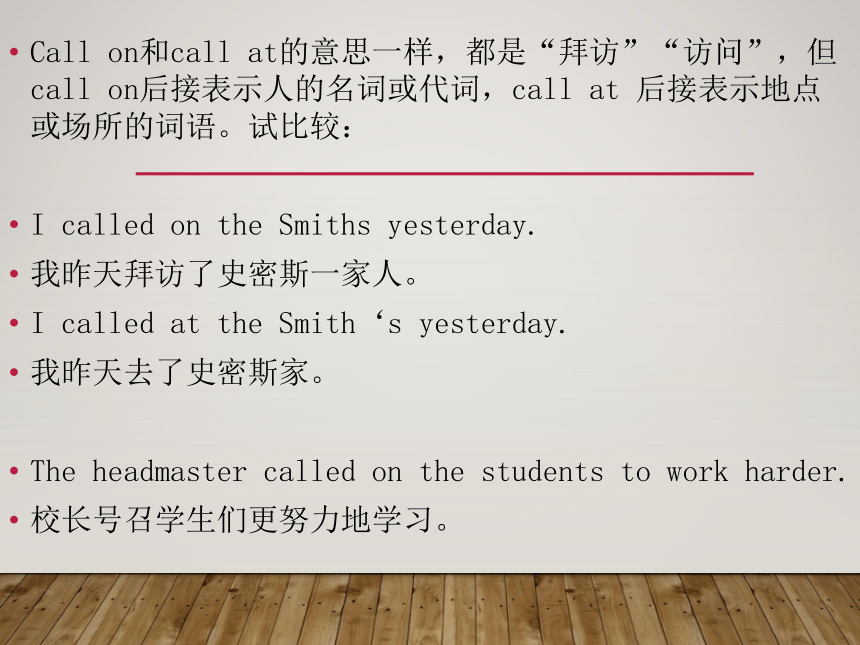
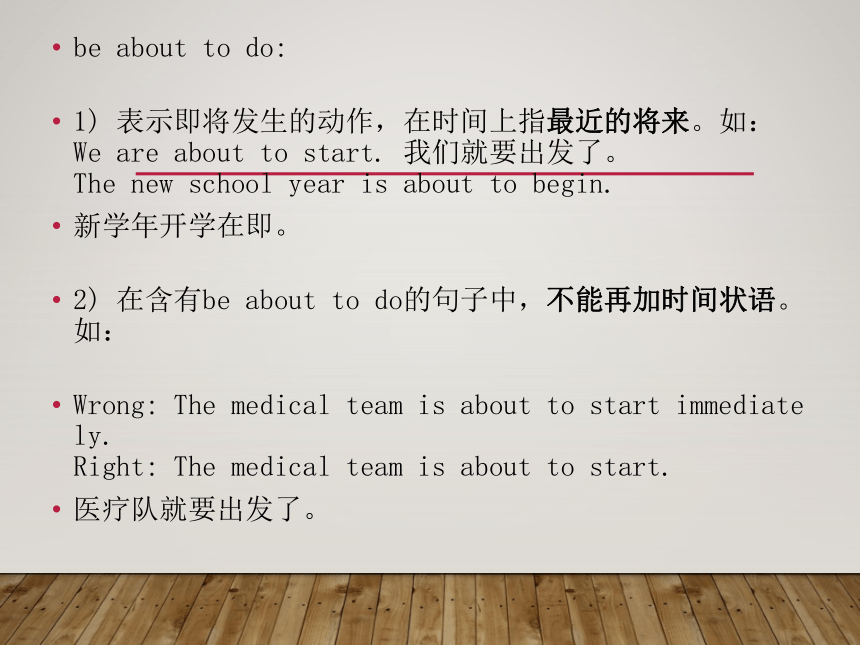
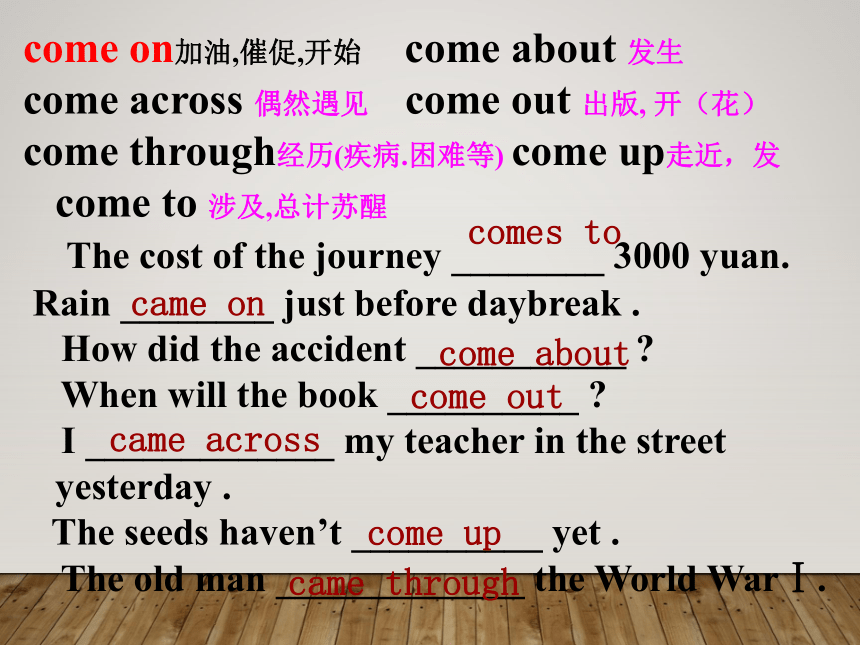
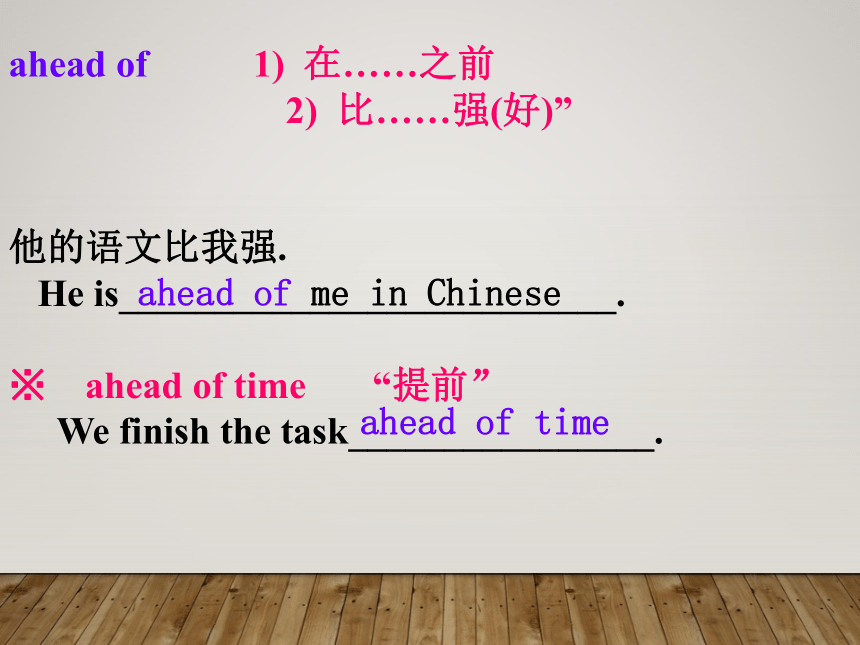
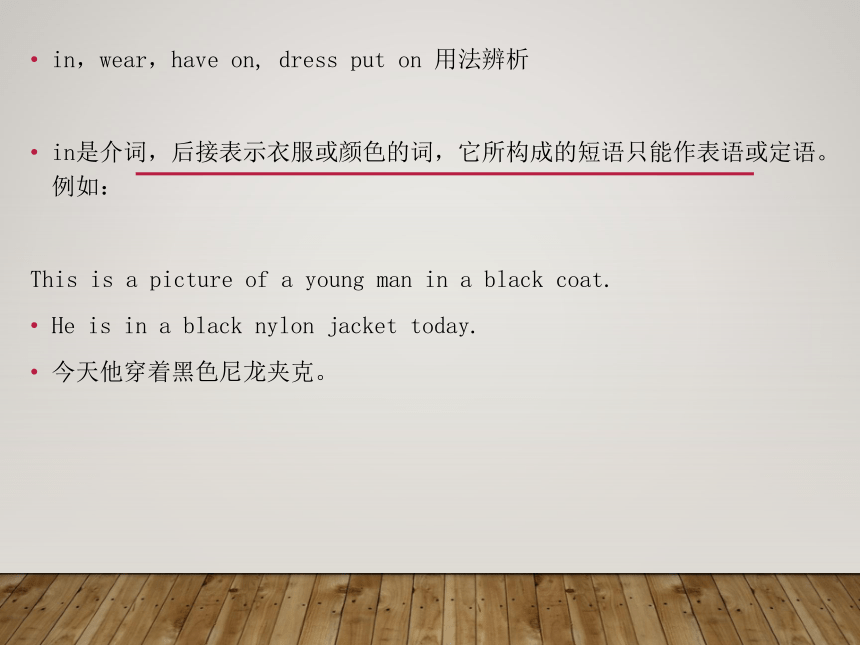
文档简介
课件39张PPT。Unit 3 Language points at the time 当时,那时 作时间状语
你不了解她当时急切的心情。
You didn't know how eager she was at the time.
sort out 分类,整理/澄清,解决(问题/困难)
我分拣邮件。
I sort out the mail. 我们有几个小问题要解决。
We’ve got a few little problems to sort out. call out 大声叫喊,大声说出
联想
call for 接(人) ;/需要,要求
call off 喊走,叫……走开;/取消
call up 给……打电话;/使想起(往事)
call in 来访;/召来,请来
call on 访问(某人);/号召
Call for 有几个不同的意思:
1.作“要求”、“需要”、“提倡”解。如: Success calls for hard work. 成功要靠勤奋。 The work calls for a lot of time. 这项工作需要大量时间。
2.表示“接(某人)”、“来取(某物)”。如: I‘ll call for you at sever this evening. 今晚七点我来接你。 We call for the package at the post office.我们到邮局去取包裹。
3.表示"喊着要人取来",相当于ask for。如: The man sat down and called for a glass of beer. 那人坐下来,要了一杯啤酒。取消 Why was the football match called off? 足球赛为什么取消?
2. 喊走 Call off your dog, will you? 把你的狗喊走,好吗?
Call up是“打电话”之意,相当于ring up或telephone或phone。 如:
I‘ll call you up tomorrow. 我明天给你打电话。
另外,call up 还有“回想起”之意。如:
Your letter called up the days when we worked together.
你的信使我回想起我们一同工作的日子He just calls in occasionally...
他只是偶尔过来坐坐。
We could call in on Patrick on the way to your mother's.
我们到你母亲家去, 不妨顺路到帕特里克家串个门儿.
Your father is ill, you should call in a doctor at once.
你父亲病了,应该马上去请个大夫来。
Call on和call at的意思一样,都是“拜访”“访问”,但call on后接表示人的名词或代词,call at 后接表示地点或场所的词语。试比较:
I called on the Smiths yesterday.
我昨天拜访了史密斯一家人。
I called at the Smith‘s yesterday.
我昨天去了史密斯家。
The headmaster called on the students to work harder.
校长号召学生们更努力地学习。 be?about?to?do:?
1)?表示即将发生的动作,在时间上指最近的将来。如: We?are?about?to?start.?我们就要出发了。 The?new?school?year?is?about?to?begin.?
新学年开学在即。
2)?在含有be?about?to?do的句子中,不能再加时间状语。如:
Wrong:?The?medical?team?is?about?to?start?immediately.? Right:?The?medical?team?is?about?to?start.?
医疗队就要出发了。 come on加油,催促,开始 come about 发生
come across 偶然遇见 come out 出版, 开(花)
come through经历(疾病.困难等) come up走近,发come to 涉及,总计苏醒
The cost of the journey ________ 3000 yuan.
Rain ________ just before daybreak .
How did the accident ___________ ?
When will the book __________ ?
I _____________ my teacher in the street yesterday .
The seeds haven’t __________ yet .
The old man _____________ the World WarⅠ.comes to came on come aboutcome outcame across come upcame throughahead of 1) 在……之前
2) 比……强(好)”
他的语文比我强.
He is__________________________.
※ ahead of time “提前”
We finish the task________________.ahead of me in Chineseahead of timein,wear,have on, dress put on 用法辨析
in是介词,后接表示衣服或颜色的词,它所构成的短语只能作表语或定语。例如:
This is a picture of a young man in a black coat.
He is in a black nylon jacket today.
今天他穿着黑色尼龙夹克。
wear “穿着;戴着”,表示状态,宾语可以是衣帽,也可以是饰物、奖章等。例如:
You’d better wear blue or black pants with blown shoes.
穿棕色鞋子的时候, 最好要穿蓝色或黑色裤子。
Why does he often wear dark sunglasses? 他为什么经常戴着深色的太阳镜?
have on的意思是“穿着,戴着”,例如:
I’ll have on black pants and a gray shirt tomorrow.
明天我会穿一条黑色的长裤和一件灰色的衬衫。dress的宾语通常是人,意思是“给……穿衣服”。dress oneself 或 get dressed表示给自己穿衣服。例如:
My son is now able to dress himself.
我儿子现在自己会穿衣服了。
It’s time to wake up and get dressed!
该起床穿衣服了。
be dressed in 的意思是“穿着”,表示状态。
She is dressed in a fur coat. 她穿着毛皮大衣。
dress up的意思是“盛装打扮、乔装打扮”。
I’d like you to dress up for my birthday party tonight.
今晚我希望你为我的生日派对打扮打扮。
Young kids often dress up and have fun at Halloween. [ 'h?l?u'i:n ]?
万圣节前夜,小孩子通常都乔装打扮,玩得很开心。
put on “穿上、戴上”,强调“穿”“戴”的动作,后接衣服、鞋帽等。例如:
Put on your heavy winter coat if you are going out.
如果你要出去,穿上你的厚冬衣。
lead 表示“作导向”,例如:
All roads lead to Rome. 殊途同归。
Your explanation has led me to a clear understanding.
你的解释让我理解清楚了。
lead sb to do 表示“使…干”,例如:
What led you to believe it? 什么使你相信它?a pack of 一盒,一包;一伙…,一群…
一群猎犬追捕狐狸。
A pack of dogs chased the fox.
一包香烟。
a pack of cigarettesaim at 是“瞄准”、“针对”的意思。例如:
He aimed at the bird but missed. 他瞄准那只鸟射击,可是没打中。
He is aiming at the target. 他在瞄靶。 I am not aiming at you. 我不是针对你。 aim to do(美)= aim at doing(英),是“目的在于”的意思,但在具体句子中可以有不同的含义。例如: He aims at mastering English. 他目的在于掌握英语。 He aims to master English. (同上) 下面两句 = I hope to finish it tomorrow. I aim at finishing it tomorrow. I aim to finish it tomorrow. 我想在明天完成它。 下面两句 = I try to learn ten new words by heart every day. I aim at learning ten new words by heart every day. I aim to learn ten new words by heart every day. 我要每天记十个新词。
let go 松开;放手
(1)握紧绳子别松手。
Don’t __________ the rope.
(2)松手!你把我弄痛了。
_______! You’re hurting me.let go Let go Being_badly_wounded,the whale soon died. (PP.20~17)
鲸因为受了重伤,没过多久就死了。
句型 being+done...(作原因、时间等状语)
说明 完成式为having been done
根据中文意思完成英语句子。
(1)当被问到谁偷了钱时,这个年轻人沉默了。
______________ who stole the money,the young man kept
silent.
(2)由于受到很好的照顾,这些树长得越来越壮。
______________________,the trees are growing better and better.
(3)约翰被关在监狱许多年后,最近获释。
____________________ in prison for many years,John has
recently been set free.Being asked Being taken good care of Having been kept bring in “收(庄稼);引进;挣得(钱)”
bring out 使(意义等)明白表示出来,生产
bring up 吐出; 抚养,养育
bring about 带来,造成
What __________________his illness ?
Please _____________ the meaning of
the passage .
Henry____________________ by his uncle .
When he was young , he began to
sell goods , which made him _________
a lot of money .brought about bring out was brought up bring in feed on “吃,以……为主食”
Cows feed on hay干草during winter .
◆ feed … on sth= feed sth to …“以…为饲养”
We feed our dogs _______meat .
= We feed meat _______ our dogs .onto hold up 举起;抬起;承受住;支撑;维持;保持良好;阻
挡;使停顿;耽误
观察下列句子,说出hold up在句中的含义。
(1)The pupil held up his hand to ask the teacher a question.
(2)The chair was too weak to hold him up.
(3)I hope the fine weather will hold up.
提示 hold up作“阻挡,使停顿,耽误”解时,常用被动语态。
(4)We were held up for five minutes in a traffic jam.
答案:(1)举起 (2)承受,支撑 (3)持续;维持 (4)阻塞联想 keep up继续,坚持
take up开始从事于;占据;拿起
bring up抚养,培养
make up组成;编造;化妆
pick up拾起;学会;得到;(用车)去接,搭载
put up搭建起;张贴;投宿
set up建立,建造
show up露面,出席
throw up呕吐
turn up出现,出席;调高(音量) 如何记忆形容词的排列顺序? 英语中表示修饰的形容词又是该如何排列的呢?如果你记住osacom这个为帮助记忆而杜撰的词,?就能掌握英语中形容词排列的顺序。那什么叫做osacom呢?Osacom
o代表opinion,指表示人们观点的形容?词,如beautiful,horrible,lovely,nice等;
s代表shape,指表示形状大小的形容词,如long,short,round,?narrow, little等;
a代表age,指表示年龄、时代的形容词,如old,new,young等;
c代表colour,指表示颜色的形容词,如red, black,?orange等; o代表origin,指表示国籍、地区的形容词,如British,Canadian,German等;
m代表material,指表示材料的形容词,如plastic,metal等。
英语中这六类形容词连用时就按上述先后顺序列,?如:
a?nice?long?new?black?British?plastic?pen?
当然,实际语言使用中不可能出现这么多形容词连用的情况请根据形容词排列规则完成以下练习:
1.She has a ___________________ jacket.
(leather, brown, beautiful) 2.He has a ______________________ car.
(American,long,red) 3.They live in a _________________ house.
(old, beautiful) 4.We have a ____________________ table. 古代的,古老的 [?n'ti:k] (antique, small,wooden) 5. She has a ___________________ jumper.
(woolen, lovely, red) (套头式的)毛线衣
beautiful brown leatherlong red Americanbeautiful oldsmall antique woodenlovely red woolenin between 在两者之间
You’d have a good view of the sea from here except for the block
of flats in between.
要不是隔着这座公寓大楼,大海的景色就可以从这里一览无
遗。
Society is made up of a variety of people;some are good,
others bad,and still others in between.
社会是由形形色色的人组成。有些人很好,有些人很坏,也有
些人介乎两者之间。The water was quite shallow but where the reef ended,there
was a sharp drop to the sandy ocean floor.
水很浅,但到了珊瑚礁的尽头,就有一个陡坡,一直降到满是
沙子的海底。
点拨 where此处引出地点状语从句。地点状语从句一般放在主
句之后,但在一些谚语中或表示抽象意义的句子中,常把地点
状语从句放在主句之前。此时的where大体相当于in/at the
place where,所以不可像引导定语从句的where那样换成in/at
which。Where there is a will,there is a way.有志者,事竟成。
Where others are weak,he is strong.别人的弱点正是他的优势。
(1)请你待在原地。
Please stay ____________________.
(2)你要让这个小孩待在你能看得见他的地方。
You must keep the little child _________________________.
(3)不要把药瓶放在孩子们够得着的地方。
Don’t leave the medicine bottle ______________________________.where you arewhere you can see himwhere the children can get itTranslate some sentences :
他的思想走在时代的前列.
我失业时没有人帮我.
坐在房间时,他没有觉察到危险.
He is ahead of times in his ideas .Nobody helped me out when I lost my job.Sitting in the room ,he wasn’t aware of the danger .4. 会议还要一个小时才开; 在此期间让我们
休息一会.
5. 他们都被那可怕的暴风雪吓死了.
6. 他在找书时,把房间翻得乱七八糟.The meeting will begin in an hour ;in the meantime , let’s have a rest .They were scared to death by the terrible storm .Looking for his book , he turned the whole room upside down .7. 他总是急人之难。
8. 我提前几天完成了工作.
9. 他被他的父母抛弃了.
10. 我还没意识到她在场, 她就站在我身边了.
11. 她每读一本书都喜欢反思一下书的意义.He’s always willing to help out a person in trouble.I finished the work several days ahead of time.He was abandoned by his parents.She was standing right next to me before I became aware of her presence.Whenever she reads a book, she likes to reflect on its meaning for a while.12. 她喜欢把自己倒吊在操场的器械上.
13. 夜里一些奇怪的声音把我吓得半死.
14. 新秘书在下周前还不会来, 在此期间, 我们安排了一位临时秘书.She likes to hang herself upside down on the playground equipmentSome strange noises in the night scared me half to deathThe new secretary won’t come until next week; in the meantime, we’ve arranged for a temporary one.
你不了解她当时急切的心情。
You didn't know how eager she was at the time.
sort out 分类,整理/澄清,解决(问题/困难)
我分拣邮件。
I sort out the mail. 我们有几个小问题要解决。
We’ve got a few little problems to sort out. call out 大声叫喊,大声说出
联想
call for 接(人) ;/需要,要求
call off 喊走,叫……走开;/取消
call up 给……打电话;/使想起(往事)
call in 来访;/召来,请来
call on 访问(某人);/号召
Call for 有几个不同的意思:
1.作“要求”、“需要”、“提倡”解。如: Success calls for hard work. 成功要靠勤奋。 The work calls for a lot of time. 这项工作需要大量时间。
2.表示“接(某人)”、“来取(某物)”。如: I‘ll call for you at sever this evening. 今晚七点我来接你。 We call for the package at the post office.我们到邮局去取包裹。
3.表示"喊着要人取来",相当于ask for。如: The man sat down and called for a glass of beer. 那人坐下来,要了一杯啤酒。取消 Why was the football match called off? 足球赛为什么取消?
2. 喊走 Call off your dog, will you? 把你的狗喊走,好吗?
Call up是“打电话”之意,相当于ring up或telephone或phone。 如:
I‘ll call you up tomorrow. 我明天给你打电话。
另外,call up 还有“回想起”之意。如:
Your letter called up the days when we worked together.
你的信使我回想起我们一同工作的日子He just calls in occasionally...
他只是偶尔过来坐坐。
We could call in on Patrick on the way to your mother's.
我们到你母亲家去, 不妨顺路到帕特里克家串个门儿.
Your father is ill, you should call in a doctor at once.
你父亲病了,应该马上去请个大夫来。
Call on和call at的意思一样,都是“拜访”“访问”,但call on后接表示人的名词或代词,call at 后接表示地点或场所的词语。试比较:
I called on the Smiths yesterday.
我昨天拜访了史密斯一家人。
I called at the Smith‘s yesterday.
我昨天去了史密斯家。
The headmaster called on the students to work harder.
校长号召学生们更努力地学习。 be?about?to?do:?
1)?表示即将发生的动作,在时间上指最近的将来。如: We?are?about?to?start.?我们就要出发了。 The?new?school?year?is?about?to?begin.?
新学年开学在即。
2)?在含有be?about?to?do的句子中,不能再加时间状语。如:
Wrong:?The?medical?team?is?about?to?start?immediately.? Right:?The?medical?team?is?about?to?start.?
医疗队就要出发了。 come on加油,催促,开始 come about 发生
come across 偶然遇见 come out 出版, 开(花)
come through经历(疾病.困难等) come up走近,发come to 涉及,总计苏醒
The cost of the journey ________ 3000 yuan.
Rain ________ just before daybreak .
How did the accident ___________ ?
When will the book __________ ?
I _____________ my teacher in the street yesterday .
The seeds haven’t __________ yet .
The old man _____________ the World WarⅠ.comes to came on come aboutcome outcame across come upcame throughahead of 1) 在……之前
2) 比……强(好)”
他的语文比我强.
He is__________________________.
※ ahead of time “提前”
We finish the task________________.ahead of me in Chineseahead of timein,wear,have on, dress put on 用法辨析
in是介词,后接表示衣服或颜色的词,它所构成的短语只能作表语或定语。例如:
This is a picture of a young man in a black coat.
He is in a black nylon jacket today.
今天他穿着黑色尼龙夹克。
wear “穿着;戴着”,表示状态,宾语可以是衣帽,也可以是饰物、奖章等。例如:
You’d better wear blue or black pants with blown shoes.
穿棕色鞋子的时候, 最好要穿蓝色或黑色裤子。
Why does he often wear dark sunglasses? 他为什么经常戴着深色的太阳镜?
have on的意思是“穿着,戴着”,例如:
I’ll have on black pants and a gray shirt tomorrow.
明天我会穿一条黑色的长裤和一件灰色的衬衫。dress的宾语通常是人,意思是“给……穿衣服”。dress oneself 或 get dressed表示给自己穿衣服。例如:
My son is now able to dress himself.
我儿子现在自己会穿衣服了。
It’s time to wake up and get dressed!
该起床穿衣服了。
be dressed in 的意思是“穿着”,表示状态。
She is dressed in a fur coat. 她穿着毛皮大衣。
dress up的意思是“盛装打扮、乔装打扮”。
I’d like you to dress up for my birthday party tonight.
今晚我希望你为我的生日派对打扮打扮。
Young kids often dress up and have fun at Halloween. [ 'h?l?u'i:n ]?
万圣节前夜,小孩子通常都乔装打扮,玩得很开心。
put on “穿上、戴上”,强调“穿”“戴”的动作,后接衣服、鞋帽等。例如:
Put on your heavy winter coat if you are going out.
如果你要出去,穿上你的厚冬衣。
lead 表示“作导向”,例如:
All roads lead to Rome. 殊途同归。
Your explanation has led me to a clear understanding.
你的解释让我理解清楚了。
lead sb to do 表示“使…干”,例如:
What led you to believe it? 什么使你相信它?a pack of 一盒,一包;一伙…,一群…
一群猎犬追捕狐狸。
A pack of dogs chased the fox.
一包香烟。
a pack of cigarettesaim at 是“瞄准”、“针对”的意思。例如:
He aimed at the bird but missed. 他瞄准那只鸟射击,可是没打中。
He is aiming at the target. 他在瞄靶。 I am not aiming at you. 我不是针对你。 aim to do(美)= aim at doing(英),是“目的在于”的意思,但在具体句子中可以有不同的含义。例如: He aims at mastering English. 他目的在于掌握英语。 He aims to master English. (同上) 下面两句 = I hope to finish it tomorrow. I aim at finishing it tomorrow. I aim to finish it tomorrow. 我想在明天完成它。 下面两句 = I try to learn ten new words by heart every day. I aim at learning ten new words by heart every day. I aim to learn ten new words by heart every day. 我要每天记十个新词。
let go 松开;放手
(1)握紧绳子别松手。
Don’t __________ the rope.
(2)松手!你把我弄痛了。
_______! You’re hurting me.let go Let go Being_badly_wounded,the whale soon died. (PP.20~17)
鲸因为受了重伤,没过多久就死了。
句型 being+done...(作原因、时间等状语)
说明 完成式为having been done
根据中文意思完成英语句子。
(1)当被问到谁偷了钱时,这个年轻人沉默了。
______________ who stole the money,the young man kept
silent.
(2)由于受到很好的照顾,这些树长得越来越壮。
______________________,the trees are growing better and better.
(3)约翰被关在监狱许多年后,最近获释。
____________________ in prison for many years,John has
recently been set free.Being asked Being taken good care of Having been kept bring in “收(庄稼);引进;挣得(钱)”
bring out 使(意义等)明白表示出来,生产
bring up 吐出; 抚养,养育
bring about 带来,造成
What __________________his illness ?
Please _____________ the meaning of
the passage .
Henry____________________ by his uncle .
When he was young , he began to
sell goods , which made him _________
a lot of money .brought about bring out was brought up bring in feed on “吃,以……为主食”
Cows feed on hay干草during winter .
◆ feed … on sth= feed sth to …“以…为饲养”
We feed our dogs _______meat .
= We feed meat _______ our dogs .onto hold up 举起;抬起;承受住;支撑;维持;保持良好;阻
挡;使停顿;耽误
观察下列句子,说出hold up在句中的含义。
(1)The pupil held up his hand to ask the teacher a question.
(2)The chair was too weak to hold him up.
(3)I hope the fine weather will hold up.
提示 hold up作“阻挡,使停顿,耽误”解时,常用被动语态。
(4)We were held up for five minutes in a traffic jam.
答案:(1)举起 (2)承受,支撑 (3)持续;维持 (4)阻塞联想 keep up继续,坚持
take up开始从事于;占据;拿起
bring up抚养,培养
make up组成;编造;化妆
pick up拾起;学会;得到;(用车)去接,搭载
put up搭建起;张贴;投宿
set up建立,建造
show up露面,出席
throw up呕吐
turn up出现,出席;调高(音量) 如何记忆形容词的排列顺序? 英语中表示修饰的形容词又是该如何排列的呢?如果你记住osacom这个为帮助记忆而杜撰的词,?就能掌握英语中形容词排列的顺序。那什么叫做osacom呢?Osacom
o代表opinion,指表示人们观点的形容?词,如beautiful,horrible,lovely,nice等;
s代表shape,指表示形状大小的形容词,如long,short,round,?narrow, little等;
a代表age,指表示年龄、时代的形容词,如old,new,young等;
c代表colour,指表示颜色的形容词,如red, black,?orange等; o代表origin,指表示国籍、地区的形容词,如British,Canadian,German等;
m代表material,指表示材料的形容词,如plastic,metal等。
英语中这六类形容词连用时就按上述先后顺序列,?如:
a?nice?long?new?black?British?plastic?pen?
当然,实际语言使用中不可能出现这么多形容词连用的情况请根据形容词排列规则完成以下练习:
1.She has a ___________________ jacket.
(leather, brown, beautiful) 2.He has a ______________________ car.
(American,long,red) 3.They live in a _________________ house.
(old, beautiful) 4.We have a ____________________ table. 古代的,古老的 [?n'ti:k] (antique, small,wooden) 5. She has a ___________________ jumper.
(woolen, lovely, red) (套头式的)毛线衣
beautiful brown leatherlong red Americanbeautiful oldsmall antique woodenlovely red woolenin between 在两者之间
You’d have a good view of the sea from here except for the block
of flats in between.
要不是隔着这座公寓大楼,大海的景色就可以从这里一览无
遗。
Society is made up of a variety of people;some are good,
others bad,and still others in between.
社会是由形形色色的人组成。有些人很好,有些人很坏,也有
些人介乎两者之间。The water was quite shallow but where the reef ended,there
was a sharp drop to the sandy ocean floor.
水很浅,但到了珊瑚礁的尽头,就有一个陡坡,一直降到满是
沙子的海底。
点拨 where此处引出地点状语从句。地点状语从句一般放在主
句之后,但在一些谚语中或表示抽象意义的句子中,常把地点
状语从句放在主句之前。此时的where大体相当于in/at the
place where,所以不可像引导定语从句的where那样换成in/at
which。Where there is a will,there is a way.有志者,事竟成。
Where others are weak,he is strong.别人的弱点正是他的优势。
(1)请你待在原地。
Please stay ____________________.
(2)你要让这个小孩待在你能看得见他的地方。
You must keep the little child _________________________.
(3)不要把药瓶放在孩子们够得着的地方。
Don’t leave the medicine bottle ______________________________.where you arewhere you can see himwhere the children can get itTranslate some sentences :
他的思想走在时代的前列.
我失业时没有人帮我.
坐在房间时,他没有觉察到危险.
He is ahead of times in his ideas .Nobody helped me out when I lost my job.Sitting in the room ,he wasn’t aware of the danger .4. 会议还要一个小时才开; 在此期间让我们
休息一会.
5. 他们都被那可怕的暴风雪吓死了.
6. 他在找书时,把房间翻得乱七八糟.The meeting will begin in an hour ;in the meantime , let’s have a rest .They were scared to death by the terrible storm .Looking for his book , he turned the whole room upside down .7. 他总是急人之难。
8. 我提前几天完成了工作.
9. 他被他的父母抛弃了.
10. 我还没意识到她在场, 她就站在我身边了.
11. 她每读一本书都喜欢反思一下书的意义.He’s always willing to help out a person in trouble.I finished the work several days ahead of time.He was abandoned by his parents.She was standing right next to me before I became aware of her presence.Whenever she reads a book, she likes to reflect on its meaning for a while.12. 她喜欢把自己倒吊在操场的器械上.
13. 夜里一些奇怪的声音把我吓得半死.
14. 新秘书在下周前还不会来, 在此期间, 我们安排了一位临时秘书.She likes to hang herself upside down on the playground equipmentSome strange noises in the night scared me half to deathThe new secretary won’t come until next week; in the meantime, we’ve arranged for a temporary one.
